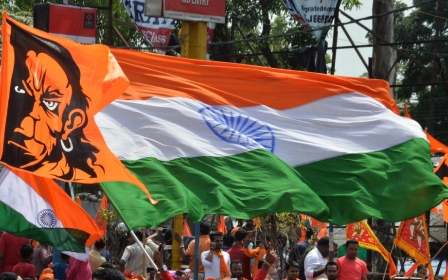Indian elections: With their future at stake, do Muslims' votes matter?

As India conducts its crucial multi-phase parliamentary election, the fate of the country’s 220 million Muslims hangs in the balance. Amid increasing marginalisation, this minority community is confronted with the disquieting reality of diminishing relevance in the electoral exercise.
Once a crucial voting bloc, Muslims now seem to have little strategic influence. Prime Minister Narendra Modi, who is vying for a third term in office, has shown no inclination to entice Muslims to vote for his ruling Bharatiya Janata Party (BJP).
On the contrary, he has fuelled his campaign with anti-Muslim hate speech, while his party members have launched tirades against the community. At a campaign rally in Rajasthan late last month, Modi referred to Muslims as “infiltrators” and “those who have more children”, while warning that the opposition Congress Party would redistribute the country’s wealth to Muslims.
The BJP also published an animated video alleging that the Congress would snatch the wealth of non-Muslims and distribute it to Muslims, comparing them to “invaders, terrorists, robbers and thieves”. Days later, Modi accused the Congress of advocating “vote jihad”, an antiquated conspiracy theory perpetuated by Hindu nationalists.
This appears to mark a strategic shift for Modi and his Hindu right-wing party, which had previously touted its inclusive slogan of “sabka saath, sabka vikas” (meaning “everyone’s support, everyone’s development”).
Stay informed with MEE's newsletters
Sign up to get the latest alerts, insights and analysis, starting with Turkey Unpacked
Today, the party’s discernible modus operandi to invoke Hindu religious sentiments and make divisive communal statements is a tactical choice, which aims to consolidate and mobilise the Hindu voting bloc for electoral gains. This arguably makes Muslim voters irrelevant in the country’s electoral landscape.
In India’s lower house of parliament, the Lok Sabha, only 27 of 543 legislators are Muslim. The decline in the share of Muslim MPs, which hit an all-time low in 2014, often coincides with the rise of the BJP’s fortunes.
Minimal influence
Despite constituting around 15 percent of India’s total population, Muslims are distributed unevenly across electoral constituencies, curbing their ability to effectively organise. In 405 out of 543 Lok Sabha constituencies, their proportion of the total population is less than 15 percent. In other words, in almost 75 percent of the country’s constituencies, Muslims wield minimal influence over electoral outcomes.
Conversely, there are approximately 94 constituencies where Muslims comprise between 15 and 30 percent of the population, and about 44 constituencies where they make up more than 30 percent, holding more potential to significantly impact electoral outcomes.
This underscores ominous signs of Muslim disenfranchisement in India, as Modi and the BJP advance their Hindutva agenda
It thus comes as no surprise that Muslims seek to use their limited electoral influence in a calculated manner, typically backing non-BJP or anti-BJP outfits such as the Congress, or Muslim-oriented parties such as the Indian Union Muslim League, among others.
Strategic considerations thus factor into how Muslims cast their ballots. In areas where they perceive themselves to be a distinct and vulnerable minority, they sometimes refrain from antagonising mainstream parties, instead seeking protection by aligning with the likely winner. This could explain why nearly eight percent of Muslim voters cast a ballot for the BJP in 2019.
In constituencies with significant Muslim demographics, there’s a tendency for Muslim voters to support Muslim candidates. Others vote tactically, selecting the candidate with the best chance of defeating the BJP. In Uttar Pradesh, for example, Muslims have been described as observing a “tactical silence” in the ongoing election, while voting strategically to defeat the BJP on a seat-by-seat basis.
Vote fragmentation
Since the rise of Modi in 2014, however, this strategy has faced limitations that the BJP exploits. In areas dominated by strong regional parties, Muslim votes often fragment as community members back non-Congress alternatives. In the 2019 elections, for example, the BJP won 36 of the 80 Lok Sabha seats where Muslims constituted 20 percent of the population.
The tactical shift in voting patterns comes amid a perception that many non-BJP parties have failed to address the concerns and anxieties of Muslim communities, especially since Modi took office. The BJP’s unambiguous embrace of Hindu nationalism has precipitated a rightward shift in India’s political discourse on religion. Congress members have themselves been accused of adopting a type of “soft Hindutva”.
This approach involves endorsing certain moderate aspects of Hindu nationalism and engaging in performative Hindu practices, in an effort to regain support from Hindu voters who have drifted towards the BJP. The Congress has also distanced itself from some Muslim-centric issues under the guise of inclusive Hinduism.
Despite pandering to the Hindu vote, the Congress has seen limited success, as the BJP continues to dominate Hindutva discourse.
Crucially, the BJP has attempted to fracture the Muslim voting bloc by courting a marginalised subset known as Pasmanda Muslims, exploiting intra-religious divisions while strategically avoiding alignment with orthodox sects. This tactic serves to counter accusations of majoritarianism, portraying the BJP as a more encompassing political entity. By addressing the socioeconomic grievances of Pasmanda Muslims, who often hail from poor backgrounds, the BJP aims to demonstrate a commitment to social equity.
Meanwhile, in the run-up to the second phase of the election on 26 April, a significant portion of Muslim voters in Mathura, a city in Uttar Pradesh, found themselves unable to cast their votes. This underscores ominous signs of Muslim disenfranchisement in India, as Modi and the BJP advance their Hindutva agenda.
The views expressed in this article belong to the author and do not necessarily reflect the editorial policy of Middle East Eye.
Middle East Eye delivers independent and unrivalled coverage and analysis of the Middle East, North Africa and beyond. To learn more about republishing this content and the associated fees, please fill out this form. More about MEE can be found here.






